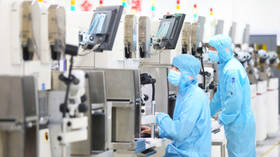
Washington has restricted the export of a broad range of chipmaking tools and software to China


China’s Ministry of Commerce has vowed to take “necessary measures” to safeguard its interests after the US imposed sweeping export controls aimed at crippling the Chinese semiconductor industry.
The US Department of Commerce announced on Monday that it would ban the export of 24 types of chip manufacturing equipment, three software programs, and high bandwidth memory to China. Additionally, 140 Chinese entities – including toolmakers, chip fabricators, and investment firms – were added to the department’s blacklist over their role in developing China’s domestic semiconductor industry.
In a statement, the Commerce Department claimed that Chinese semiconductors “can be used in the next generation of advanced weapon systems and in artificial intelligence,” which “pose a substantial risk to US national security.”
“This is a typical act of economic coercion and non-market practice,” a spokesperson for the Chinese ministry said in response. “The US says one thing and does another… abusing export control measures, and implementing unilateral bullying. China firmly opposes this.”
The spokesperson observed that the “semiconductor industry is highly globalized,” and said that unilateral actions like those taken by the US hinder free and open trade between other nations.
“China will take necessary measures to resolutely safeguard its legitimate rights and interests,” they concluded.
China’s semiconductor industry has been targeted by successive US administrations, with Donald Trump banning the export of certain chipmaking equipment to Semiconductor Manufacturing International Corp (SMIC), China’s top chip manufacturer, during his first term in office. President Joe Biden imposed two further rounds of export controls, while allocating tens of billions of dollars to boost the production of semiconductors in the US.
The White House has also held talks with Japan, South Korea, and Taiwan aimed at formalizing the so-called ‘Chip 4 Alliance’, which Beijing sees as an attempt by Washington to “dominate the global semiconductor production and supply chain.”
Despite this pressure campaign, SMIC succeeded two years ago in machining chips to the highest Western standards. This breakthrough came despite Dutch and Japanese toolmakers being forbidden by Washington from supplying SMIC with their most advanced tools.
Energy News Beat
